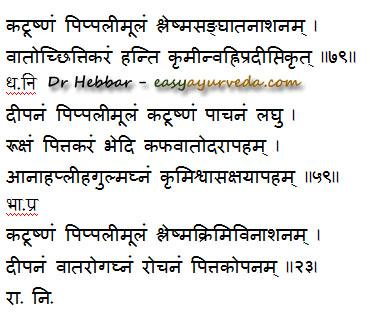Long pepper Root – Pippali mool Uses, Side Effects, Research
Long pepper root is called Ganthoda or Piparmool. It is hot, useful in asthma, indigestion, bloating, anorexia, cold, cough, low metabolism etc.
Note: We have already dealt with benefits of long pepper fruit.
Botanical Name- Piper Longum
Family- PIPERACEAE
Table of Contents
Vernacular names
Names in different languages:
Hindi Name- Pipala, Pippalki mool
English Name- Root of long pepper
Kannada Name – Hippali beru, Hippali moola
Telugu Name- Pippallu, Modi, Pippali veru, Pipli dumpa
Tamil Name- Tippali Mula, Pippali mool
Bengali Name- Pipal mool, Pipul mool
Malayalam Name -Tippali Mula
Punjabi Name- Maghaun
Gujarati Name- Ghanthod, Peeparam mool
Marathi Name- Pimparamula, Pipali mool, Pipala mool
Medicinal properties
Root of long pepper – medicinal Properties
Rasa (taste)- Katu (pungent)
Guna (qualities) – Laghu (lightness), Rooksha (dryness)
Vipaka- Katu – Undergoes pungent taste conversion after digestion.
Veerya- Ushna – Hot potency
Effect on Tridosha – Balances Kapha and Vata Dosha.
Part Used- Root
Dosage- Powder 0.5-1 g in divided dose per day.
Long pepper root uses
– Charaka sutrasthana 25
Pippalimoola (long pepper root) is best in promoting digestion, carminative and relieving bloating and constipation.
Sanskrit verse

Pippali moola Benefits
Shleshma sanghata nashana – breaks down Kapha, useful in thick sputum, sinusitis and asthma.
Krumihara – useful in worm infestation, infected wounds
Deepana – improves digestion strength
Pachana – Digestive, relieves Ama Dosha
Pittakara – Increases Pitta Dosha
Bhedi – causes purgation
Udarahara – useful in ascites, enlargement of abdomen
Anahahara – relieves gas, fullness of abdomen, bloating
Pleehanut – useful in spleen disorders, spleenomegaly
Gulmahara – useful in abdominal tumors
Shwasahara – useful in treatment of asthma and chronic respiratory disorders.
Kshayahara – useful in chronic respiratory disorders, tuberculosis
Vatahara – useful in treating disorders of Vata Dosha imbalance such as neuralgia, paralysis, constipation, bloating, etc
Rochana – improves taste, relieves anorexia
Side effects
People with Pitta imbalance will find it hard to tolerate this spicy root.
It may cause or worsen gastritis, burning sensation in stomach, throat, palm and feet.
It is best to avoid long term usage of this herb.
Can be used during pregnancy and lactation with consultation of doctor.
Interaction with medicines, supplements
Can this be used while taking Homeopathic medicine?
Yes. This product does not react with homeopathic medicine.
Can
this medicine be continued while taking supplements like multivitamin tablets,
Omega 3 fatty acids etc?
Yes. Generally, this product goes well with most
of the dietary supplements. However, if you are taking more than one product
per day, please consult your doctor for an opinion.
With western medicines
Seek your doctor’s advice if you are taking this product along with other western (allopathic / modern) medicines. Some Ayurvedic herbs can interact with modern medicine.
If both Ayurvedic and Allopathic medicines are advised together, then it is best to take Allopathic medicine first, wait for 30 minutes and then take the Ayurvedic medicine.
Classical categorization
Charaka-
Deepaniya – Digestive group of herbs
Shoola Prashamana – group of herbs that relieve abdomen pain.
Sushruta- Pippalyadi
Pippalimoola is one among the Vesavara group of herbs, used to spice up dishes. Other herbs in the group are – Ginger, pepper, long pepper fruit, coriander, cumin and pomegranate. (Dhanvantari Nighantu)
Panchakola – group of 5 spices – Long pepper fruit, Long pepper root, Chavya, Leadwort, Ginger.
Bhavaprakasha Nighantu – Haritakyaadi varga
Dhanvantari Nighantu – Shatapushpaadi varga
Raja Nighantu – Pippalyadi varga
Shodala Nighantu – Shatapushpaadi varga
Major chemical constituents
Essential oil, Piperine, B,-sitosterol, cepharadiones etc.
Sanskrit synonyms
Granthikam, Mula, Kanamula, Chavikashira, Katugranthi, Sarvagranthika
Ushanam – hot in nature
Katugranthi, Katumoola, Katushana – having pungent taste
Ayurvedic medicines
Ayurvedic medicines with Root of Piper longum
Gulgulwasavam – used in the treatment of diseases pertaining to liver and spleen.
Kiratarishta – used in the treatment of fever and haematological conditions
Saptavinshati Guggulu – used in quick healing of wounds, sinuses, skin diseases, etc.
Dadimavaleha – used in treating fever with diarrhoea, bleeding disorders, such as ulcerative colitis etc










